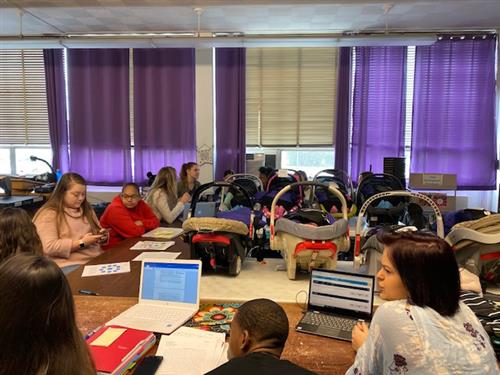Early Childhood Education
Page Navigation
- Erie High School
- Overview
-
Early Childhood Education

Early Childhood Education Video
CIP Code: 19.0708 Child Support Services Management
Pathway: HUMAN SERVICES
Instructor: Mrs. Heather Cutter
Certifications: Child Development Associate (CDA), AED, First Aid, Infant and Child CPR, Babysitting Basics, ServSafe Food Handler
Introduction - Program of Study
Early childhood personnel exhibit many different levels of educational preparation depending on their role and the type of setting in which they teach. Generally, early childhood personnel in Pennsylvania receive training by the following methods: developing and demonstrating competencies as a secondary student in a career and technical Child Care and Support Services Management program; earning an undergraduate or graduate degree in early childhood education or child development; and earning an associate degree in early childhood education, early child care and development, or child development. In addition, students can develop and demonstrate competency through a competency-based assessment such as the national Child Development Associate(CDA) program.
Individuals working in Child Care and Support Services Management positions may observe and monitor children’s activities; communicate with children’s parents of guardians, concerning daily activities and behaviors; sanitize toys and play equipment; maintain records, regarding daily observations, meals served, and medications administered; support children’s emotional and social development, encouraging understanding of others and positive imaging; and identify signs of emotional or developmental problems in children, documenting such issues for communication with parents or guardians.
Early childhood personnel may work in preschools, kindergarten classrooms, community daycare centers, before and after school daycare centers, private homes, educational consulting agencies, and early childhood classrooms.
In addition, early childhood personnel need to receive training and education in order to meet the needs of children, their families and society as a whole. In today’s educational world, parents and families contribute as much as teachers, students and administrators to the educational process. Involving these community players represents a high priority of most early childhood settings. In order to nurture the development of children and families while including them in the process, early childhood professionals must work effectively with teachers, community figures, experts, politicians and administrators.
Graduates of this program of study will receive high quality training in order to meet the needs of business and industry. In addition, the skills taught should include the seamless integration of academic concepts with technical competencies, providing the linkage from conceptual to contextual learning. Furthermore, the skills taught should offer the requisite aptitudes for job advancement, security and portability.
Early childhood education is extremely important for young children in that it builds an educational foundation for a successful progression through elementary, middle, high school and beyond. In order to build that strong foundation, a highly educated and trained workforce is essential.
Assumptions of this Program of Study
High quality programs should meet the following standards:
- Promote positive working relationships.
- Implement a curriculum that fosters all areas of skill development
- Use appropriate and effective teaching approaches.
- Provide ongoing assessment sof student progress.
- Employ and support qualified teaching staff.
- Establish and maintain relationships and use resources of the community.
- Provide a safe and healthy learning environment.
- Implement strong program organization and supervision policies that result in high quality teaching and learning.
- Integrate academic skills and aptitudes necessary for postsecondary education, gainful employment and a foundation of lifelong learning
CIP CODE: 19.0708
An instructional program that prepares individuals for a variety of occupations in child care and guidance often under the supervision of professional personnel in child or day care centers. This program includes instruction in growth and development; nutrition; program planning and management; safety; behavior guidance; play activities; child abuse and neglect; parent-child personal relationships; learning experiences for children; and laws, regulations and policies relating to child care services. Students who participate in this program will have the opportunity to complete 420 hours of hands on practical experience in Erie's Public Schools Pre-K programs. This experience will allow the qualified student to sit for the Child Development Associate certification exam before graduation.

